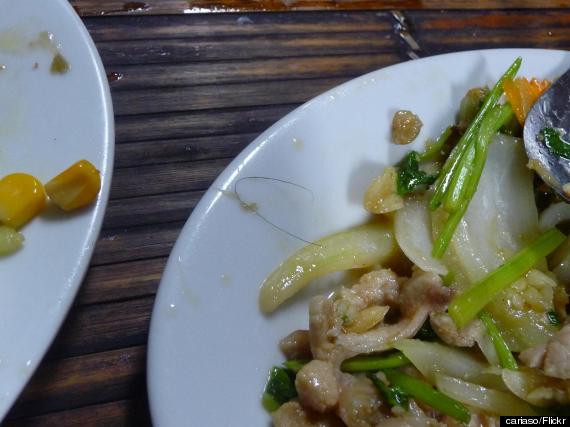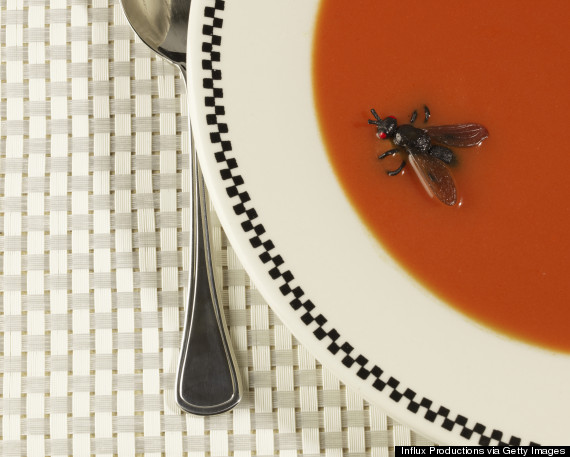
Are you grossed out by double-dipping? What about finding a hair in your food? There is no shortage of earthly phenomena and behaviors that are apt to repel our sensibilities. To be sure, disgust has a biological role: That churning feeling in your stomach helps keep you safe from things like parasites and disease.
“It’s in our everyday life," the "disgustologist" Valerie Curtis, a professor at the London School of Hygiene and Tropical Medicine, told The New York Times. "It determines our hygiene behaviors. It determines how close we get to people. It determines who we’re going to kiss, who we’re going to mate with, who we’re going to sit next to.”
But the gap between what disgusts us and what is harmful to us is a bit bigger than we might imagine. Many of the things that give us that gross-out feeling are actually pretty harmless. While they may not be any less queasy-making, at least we can rest assured that eliciting disgust is about the worst they'll do.
Double-dipping
The sad fact is that your dip is already teeming with bacteria -- and yet you usually manage to make it out of most parties and BBQs, GI tract intact. But that double-dip, according to an investigation by the Mythbusters team on the Discovery channel, adds a negligible number of microbes.
The show's hosts, Adam Savage and Jamie Hyneman, tested bacterial growth in a controlled lab environment by dipping sterilized chips into sterilized salsa placed in petri dishes. They found that "double-dipped" chips contributed between one and four bacterial colonies to the salsa in two samples, while batches of salsa that were swirled in their mouths and returned to the dish -- an approximation of the "whole mouth" theory outlined on Seinfeld -- had many magnitudes more. Sure, the television show's methodology wouldn't hold up to academic scrutiny, but it's a good reminder that a little bad party behavior won't do any real damage.
Hair in your food

Sure, it's disconcerting to find a a hair of unknown provenance in one's salad. But even though it may put you off your meal, it doesn't actually spread disease. Hair, which is made of a protein called keratin, doesn't typically harbor pathogens, according to Popular Science. And even on the off chance that a strand has been contaminated, it wouldn't typically grow into a problem. As Maria Colavincenzo, a dermatologist at Northwestern University explained:
It's possible that staph bacteria, which can upset the stomach and bring on a case of diarrhea, could hitch a ride on a strand. But it's very unlikely, Colavincenzo says, that the tiny amount of staph that can hide on a hair or two is enough to lead to gastrointestinal problems.
Public toilet seats

Yes, there are certainly germs in a public restroom and even substantial quantities of things like E. coli and S. aureus that have the potential to sicken you, but chances are they won't get the chance. Toilet seats typically make contact only with the skin of your bottom, which is impervious to most of the bacteria and viruses that hang around toilets. Those creepy crawlies require contact with a mucus membrane to cause infection.
As for the myth that one can pick up sexually-transmitted infections from a toilet seat, experts thoroughly debunk this: These viruses require a human host and do not last very long on external surfaces.
That said, it is very important to maintain good hygiene by washing hands after a trip to the bathroom. Although you are unlikely to pick up germs from contact with your rear end, your hands, which touch stall door locks and flush handles -- and, subsequently sensitive mucus membranes like your eyes and mouth -- are a different story. Make sure you're scrubbing for 15 to 20 seconds each time you wash -- the minimum amount of time required to kill bacteria. According to a recent survey, only 5 percent of Americans do so.
Eating bugs

Maybe the idea of eating bug parts gives you the heebie-jeebies, but the truth is an entomological feast is not only harmless, it may be healthy. Insects are a good source of protein and, in a world of growing human populations and diminishing resources for livestock farming, they may be the ecologically and socially responsible choice.
Ingesting insects is so harmless that the U.S. Food and Drug Administration allows certain levels of "insect filth" -- including both fragments and whole bugs -- in the food supply.
What grosses you out the most? Tell us in the comments!